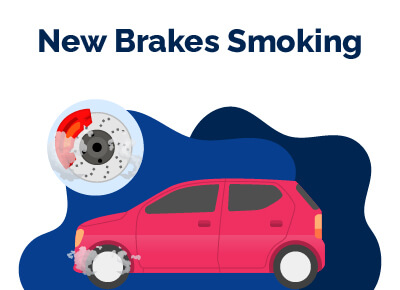New Brakes Smoking (Causes, Symptoms, and Fixes)
July 24, 2023


Chris is Head of Content for FindTheBestCarPrice and is based out of Philadelphia, PA. As a seasoned automotive industry analyst and car enthusiast, he ensures the highest level of quality across all our content and curates our picks for the best deals each month.
Chris studied information systems and marketing at Drexel University and writes about a wide range of topics ranging from car buying tips to troubleshooting common mechanical issues.
When he’s not thinking about cars, he likes to stay in with his dog and make an “attempt” to finish a crossword puzzle (he’s not quite at the Saturday/Sunday level…yet). As a former cheesemonger, Chris still has a “sharp” passion for all things cheese, and his fridge is always loaded with it!
Chris also has a passion for things that go fast, and drones are no exception. He spends some of his time writing for Dronesourced.
Regardless of whether you procured your automobile brand new or from a pre-owned vehicle dealership, the occurrence of smoking brakes is common. Typically, this predicament arises due to uncomplicated factors.
Apart from discerning the origin of your engine malfunction, understanding the standard hitches of your braking system is also imperative. The emission of brake smoke is one such scenario that mandates prompt action.
Even if you have replaced the brake pads with new ones, they might produce smoke during the wearing-in process, making it imperative to inspect them.
So, what are the root causes and some possible remedies for new brakes that smoke? Let’s find out!
Table of Contents
How Car Brakes Work
Before delving into the causes of new brake smoking and what to do if it happens, we must first understand how brakes work.
Your vehicle’s braking system comprises two key constituents: the shoes and the pads.
The brake shoes are located within the brakes and bear down on the brake drums, which are the wheel-supporting metallic cylindrical structures, to impede the wheels from rotating.
On the other hand, the brake pads are positioned externally and exert pressure on the rotors, which are the metal discs that aid the wheels’ motion, to curb the wheels’ rotation.
When you step on the brake pedal, the shoes and pads are engaged, making contact with the drums and rotors. Eventually, due to friction between the pads and rotors (or shoes and drums), the vehicle comes to a halt.
Depending on the type of vehicle, its braking system may vary. The most commonly utilized braking system is the disc brake, which employs pads to press against the rotors.
Conversely, drum brakes employ shoes that push against the drums. While ceramic or composite brakes are relatively recent advancements and use shoes and pads, they operate primarily in the same manner as conventional drum and disc brakes.
Causes of New Brake Smoking
The causes of new brake smoke following a change are rooted in factors such as the overheating of shoes and pads, a thin protective coating, an excess of paint on the brake pad backing plates, and obstructed floating caliper pins.
When There’s Too Much Paint on the Brake Pad Backing Plate
The issue of smoking brakes following a pad replacement may stem from an excessive layer of paint on the pad’s metal backing plate. This black paint was initially applied during production to prevent corrosion on the pad’s metallic backing plate.
Consequently, the brake pads become exceedingly snug, occasionally binding, and smokey post-installation.
A possible remedy for this predicament is using a flat file to remove a portion of the paint layer from the pad, albeit cautiously.
Overfiling may cause the brake pads to fit loosely in the carrier, generating a loud clicking noise while using the brakes.
During the final installation stage, it is beneficial to lubricate the rails of the carrier and the contact patch with pad grease, which facilitates smoother pad movement.
Heating Shoes and Pads
If your brakes begin to smoke after installing new pads, do not fret; it is a relatively common occurrence. This smoking phenomenon often arises due to the heat generated by the friction between the shoes and pads.
When you depress the brake pedal, the shoes and pads are pressed against the rotors or drums, slowing down the wheels. This contact produces intense heat, causing these components to smoke.
Nevertheless, rest assured that your car’s braking system is designed to withstand such high temperatures, and the brakes will cool down once the pedal is released.
However, if you continue to experience a foul odor or overheating brakes, having a mechanic inspect your vehicle would be prudent.
Floating Caliper Pins
The two categories of brake calipers are fixed and floating. As the name implies, the fixed caliper remains stationary and does not move.
Conversely, the floating caliper moves across the rotor when the brakes are engaged. This movement is modest and occurs before the pads contact the rotor.
Unlike the sliding caliper, which can only have one piston, the fixed caliper needs at least two pistons. In contrast, the floating caliper employs two pins fastened to the braking carrier to facilitate movement across the brake rotor.
Although the floating caliper is robust, it has one common defect. Damaged rubber pin boots can let in grit and moisture into the bore, leading to rust formation that can cause your pins to seize or bind, resulting in brakes smoking after a brake job.
Remove the pins and clean them using coarse sandpaper and a wire brush to remedy this issue.
Next, apply silicone grease to the pins and replace damaged rubber dust boots. If your pins become stuck inside the carrier, you must replace the entire carrier.
The Protective Coating Layer
Drivers often wonder: What causes my brakes to emit smoke following a replacement? The root of this issue lies in the fine protective coating on your new brake components, designed to prevent corrosion.
However, this coating may rub when you apply your brakes, resulting in a burning scent. As previously stated, your brake system is engineered to tolerate a certain degree of heat and will eventually cool down, so there is no cause for concern.
Nonetheless, if the burnt odor persists, seeking assistance from a skilled mechanic is highly recommended.
Seized Wheel Cylinder
Drum brake systems are equally susceptible to problems associated with moving parts.
A seized caliper in a disc brake can be likened to a seized wheel cylinder in a drum brake system. This is caused by dirt and corrosion that can accumulate within the system.
When a wheel cylinder becomes locked in place, it continuously applies retardive pressure on the internal shoe, generating heat and much friction.
Unlike calipers, diagnosing this issue through visual inspection is challenging. If you observe smoke emanating from the rear of your vehicle in your side mirrors, it’s crucial to have the brake system inspected promptly, as this problem is likely to cause harm.
Symptoms of New Brakes Smoking
Apart from visible smoke emanating from the brakes, what are the other indications of problems with the braking system? Be vigilant for any discoloration in the vicinity of the wheels.
Specifically, look for rust-hued stains on your alloy wheels’ usually clean, glossy surfaces or surrounding adornments. This is not rust but compacted brake dust produced while braking. The warmth generated from the friction causes it to stick to the wheel.
How To Prevent Brake Smoke
Adhere to these fundamental guidelines to prevent brake smoke from emanating from your vehicle:
1. Clean Brake Dust
Your service manual may refer to brake cleaning or deglazing. This process eliminates all brake dust from your wheels, preventing them from causing ongoing issues and impeding the brakes’ action, thereby reducing any smoke from the brakes.
2. Replace Parts Regularly
Refer to your owner’s manual to determine brake components’ operating limits, such as shoes, calipers, and discs.
Please adhere to the schedule and regularly inspect your brake fluid, topping it up as needed.
3. Err on the Side of Caution
Caliper issues can harm the car’s bearings and transmission. If you suspect problems with the calipers, take your vehicle to a mechanic and have the system inspected.
4. Maintain the Brake System
Well-maintained brakes are less likely to produce smoke. Conduct regular brake checks and thoroughly inspect them each time you remove the wheels.
5. Inspect Pads and Rotors
Add these to your routine inspections and look for premature wear.
6. Examine the Drum Components
Do you have an alternative braking system? Check the wheel cylinder for rust and ensure that you thoroughly inspect all parts during your inspections.
Best Car Deals by Category
Frequently Asked Questions
Why are my new brakes smoking?
Smoking brakes after changing pads or shoes is quite normal due to frictional heating of the new shoes and pads. This is caused by the shoes and pads rubbing against the rotors or drums when the brakes are applied.
Will the smoking brakes damage my car?
Your car’s brakes are designed to tolerate the heat generated during braking, so the smoking brakes will not damage your car. However, if you notice an unusual smell or your brakes are getting too hot, it’s best to take your car to a mechanic.
How long will my new brakes smoke?
Smoking should subside after a few miles of driving. However, if the smoking persists or you notice other unusual symptoms, a mechanic should inspect your brakes.
Can I drive my car with smoking brakes?
Driving your car with smoking brakes is generally safe, but it’s best to exercise caution and avoid heavy braking until the smoking stops.
How can I prevent my new brakes from smoking?
Regular maintenance and inspection of your brake system can help prevent smoking brakes. Follow the manufacturer’s recommended replacement schedule for brake components and check your brake fluid regularly.
What should I do if my new brakes are still smoking after driving for a while?
If your brakes are still smoking after driving for a while, a mechanic should inspect your car.
Smoking brakes can be a symptom of a more significant issue, such as damaged calipers, brake pads, or rotors, that needs to be addressed promptly.
Posted in Car Buying Tips, Car Troubleshooting |




